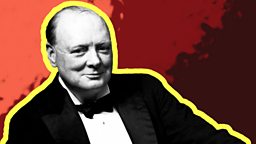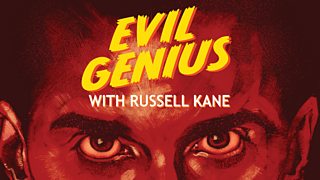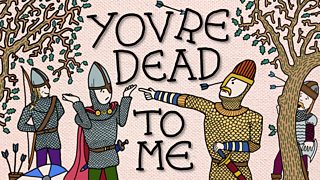Evil Genius: What鈥檚 the verdict on these historical figures?
We are living in a time of historical readjustment. Figures from the past are being reassessed, events from yesteryear are reconsidered in a different light. Heroes are reduced to zeroes while forgotten figures are finally getting their due. And it’s hard to disagree that all of this change in perspective is down to one man: Russell Kane. For over 50 episodes, his Evil Genius podcast featuring a panel of comedic opinion holders has taken those men and women who have been cluttering up history books for ages and judged to within an inch of their reputations. But were these epoch straddlers considered worthy of a big Toblerone or a slow hand clap?
Winston Churchill

War leader, Prime Minister, prolific author, finger symbol pioneer; Churchill's inspiring speeches helped Britain survive the Blitz and kept the Nazis at bay, but his controversial views about immigration and race were considered abhorrent. What did the Evil Genius panel of Daliso Chaponda, Ivo Graham and Jessica Fostekew, think about Winnie - once voted the Greatest Ever Briton?
Marx did some despicable things including getting his indentured servant pregnant and refusing to acknowledge it.
Find out what they decided here.
Karl Marx
Philosopher, economist, historian, sociologist, political theorist, journalist, socialist revolutionary and Beard of the Year 1878; Marx was a revolutionary whose teachings were adopted by Communist regimes around the world. He is considered one of the most influential figures in the creation of the modern world. At one point, Marxist inspired governments oversaw a third of the planet’s population. But at home, Marx did some despicable things including getting his indentured servant pregnant and refusing to acknowledge it. Olga Koch, Eshaan Akbar and Geoff Norcott try to decide if Marx gets full marks or no marks… for Marx.
How did he do? Hear it here.
Emmeline Pankhurst
Best known as the founder the Women’s Social and Political Union, whose members were known as suffragettes, Pankhurst fought to enfranchise British women in the early part of the 20th Century and often encouraged confrontational, destructive behaviour to achieve her aims. She was often jailed for her activities and wasn’t just a talker but very much a doer too. But historians can’t agree on whether she was an unreasonable autocrat whose militancy did little to help women get the vote or a radical world changer who improved the lives of millions of women. Sarah Keyworth, Athena Kugblenu and Luisa Omielan joined Russell to try and figure out if Emmeline was a gem-meline or a lemon-meline.
How were the votes cast? Listen to find out.
Queen Victoria

Three things you might not know about Queen Victoria
Russell Kane's Alternative Obituaries: Queen Victoria
The great-great grandmother of our current Queen was one of the most iconic monarchs to ever sit (snugly) on the throne. She presided over the dramatic expansion of the British Empire, a period that saw the country’s wealth and influence spread enormously while the conditions of its Imperial subjects suffered extensively. But was there anything Victoria could have realistically done to change the political situation or was she a power-hungry despot determined to be considered the Empress of Absolutely Everywhere? Dane Baptiste, Jodie Mitchell and Athena Kugblenu try to get to the bottom of this Albert-adoring eminence.
Mother Theresa
The only individual on our list be considered an actual saint, Mary Teresa Bojaxhiu, known to her pals as Mother Theresa, was a Catholic nun and missionary who spent most of her life helping the poorest of the poor in the slums of Kolkata, India. She helped to raise millions in charitable donations and set up clinics, soup kitchens and shelters. But others have criticised the fact that she believed in the divine power of suffering and acted not merely to help, but to also zealously convert. Alan Carr, Desiree Burch and Catherine Bohart examine the missionary’s position.
More from Radio 4
-
![]()
Evil Genius with Russell Kane
Changing the way we see heroes and villains in history.
-
![]()
Comedy of The Week
Brighten your week with the latest 大象传媒 Radio 4 comedy, introduced by Darren Harriott.
-
![]()
You're Dead To Me
Greg Jenner brings together the best names in comedy and history to learn and laugh about the past.
-
![]()
Danny Robins' classic comedy mood boost
Need a laugh? You鈥檙e not alone.




